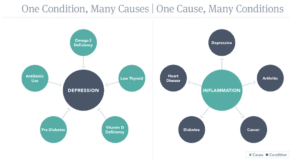Ever wondered if you or someone you love might be an empath or Highly Sensitive Person (HSP)? Empaths and HSP share many similar traits. Often we hear the two terms used interchangeably, but there are subtle differences. Let’s explore the differences and what to do if you’re feeling overwhelmed by intense emotions or trying to navigate stress or past trauma, which can affect empaths and HSPs differently.
What is a highly sensitive person? According to Dr. Elaine Aron, a highly sensitive person is someone whose nervous system is deeply attuned to their surroundings. Our brains have a mirror neuron system, which is a specialized group of cells responsible for compassion. While everyone’s brains have mirror neurons, highly sensitive people’s mirror neurons work overtime.
A highly sensitive person is high in the sensory-processing sensitivity personality trait, often measured by mental health practitioners using the Highly Sensitive Person Scale.
While being a highly sensitive person is not a disorder that needs to be treated, counseling can often help a highly sensitive person better manage their emotional response to stress and issues rooted in childhood trauma.
Does trauma cause high sensitivity? There are mixed opinions about whether or not childhood trauma causes a person to develop empathic or HSP traits, or if these are strictly personality traits you’re born with. High sensitivity includes a set of personality traits you’re born with. A common misconception is that highly sensitive people are the way they are because they experienced trauma. We do not become highly sensitive because of childhood trauma. Rather, a highly sensitive person can experience traumatic events more intensely than those with a less sensitive brain.
The confusion is understandable though because trauma can cause a jump in sensitivity for someone who was not born an HSP or empath. The trauma may cause some similar traits to emerge due to the impact trauma has on the brain and emotional system.

Trauma can cause permanent changes in the brain, including in the amygdala, which is where we process fear and emotions, and in the hippocampus, which is responsible for memories and learning. According to Dr. Aron, childhood trauma can be more damaging to a highly sensitive child’s brain because the trauma is more visceral. In other words, they are more likely to relive the event in more vivid detail both in real life and in their nightmares. They are likely to ruminate more than average about the event and suffer from a chronic hyperarousal of the nervous system (PTSD).
Highly sensitive babies and children, raised by caregivers who are depressed, stressed, anxious or emotionally unavailable, learn to deeply attune to their caregiver’s facial expressions and emotions. Often these children tend to forgo their own needs to accommodate their caregiver’s needs, developing co-dependent behaviors. They also have a tendency to strive for perfection, working to earn the love and approval of their caregiver.
Complex post-traumatic stress disorder (C-PTSD), which can occur as a result of long-term physical or sexual abuse, can also occur from childhood emotional neglect. Highly sensitive children who experience emotional neglect come to believe there is something inherently wrong with them because they’re “overly emotional” or “oversensitive.” They feel ashamed, weak or damaged. Neglect can manifest as depression, anxiety, ADD, addiction and eating disorders.
Traits of HSPs. An HSP can get overstimulated in noisy or rowdy social situations. Because they need more time to recover, they have a tendency to avoid loud parties altogether. If you’re highly sensitive, you’re likely to feel emotions more intensely than other people.
HSP’s don’t get the same dopamine hit from external stimuli that a less sensitive person might experience. That means they aren’t as inherently motivated by job promotions, awards, risky experiences, financial rewards, etc.
With brains that are constantly evaluating the emotional and social cues of others, HSPs are deeply empathetic and compassionate, including toward people they’ve never met. Of course, one of the benefits of this trait is you have the ability to pick up on people and situations that aren’t in your best interest and avoid them.

Common traits of a Highly Sensitive Person include:
- Needs alone time to recharge.
- Gets easily overwhelmed by large groups and sounds.
- Sensitive to light, smell, textures, caffeine or medications.
- Labeled as shy or sensitive as a child.
- Loves nature.
- Emotionally moved by art and music.
- Avoids violent media.
- Cares about helping others.
- Rich inner life.
- More likely to struggle from low self-esteem.
- Struggle to wind down and quiet the nervous system after a stimulating day.
An estimated 20% of the population is thought to fall into the highly sensitive camp.
Find out if you’re a highly sensitive person by taking Dr. Aron’s assessment.
What is an empath? Empathy is an incredibly valuable social skill that helps us understand how another person is feeling. But going through life as an empath isn’t the same as exhibiting empathy.
Empaths are thought to make up only about 1 or 2% of the population. Dr. Judith Orloff, author of The Empath’s Survival Guide, defines an empath as someone who shares the traits of a highly sensitive person, but their sensitivity is more extensive.
Empaths tend to be highly intuitive. They don’t just understand how another person feels, they actually feel what the other person is feeling in their own bodies. Like HSPs, an empath’s mirror neuron system in the brain is hyperactive. But their nervous system is even more attuned causing them to absorb another person’s energies into their own bodies. If you’re an empath, you may sometimes struggle to distinguish the feelings that belong to you versus another person.

Different types of empaths. Not all empaths are tuned to the same frequencies. While some empaths are emotionally attuned to other people and can pick up on emotions like joy, fear, anger or sadness, others are more physically attuned. For example, your friend has a headache and suddenly you have one too.
Another type of empath is a food empath, which is when a person is attuned to the energy of food. Empaths may experience more food sensitivities. Stress can cause food empaths to overeat and they may struggle with conditions like food addiction and binge eating sugar and other junk foods in response to overwhelming emotions.
Many empaths are raised by warm, loving parents who honor their gifts. According to Dr. Orloff, empaths who experienced abuse, bullying, frequently getting yelled at, or shamed for their sensitivity, are more likely to suffer from hypervigilance, a trauma response in which the survivor is constantly scanning their surroundings for danger.
Trauma survivors “can become exquisitely attuned to their environment to ward off threats and ensure they are safe or enter a state of hyperarousal. This hyper-vigilance is extremely draining for empaths,” Dr. Orloff writes.
Empaths can also experience deep-seated stress due to circumstances that might not seem by definition traumatizing to less sensitive people, like being raised in an overstimulating, noisy environment or experiencing a chaotic family life.
Common traits of an empath include…
- Pick up on the subtle energies of other people.
- Accurately read micro-expressions and nonverbal cues.
- Absorb other people’s emotions and physical sensations.
- Start to act, think and feel for the other person.
- Struggle to distinguish between their feelings and pain from those of another person.
- Feel emotionally drained and exhausted after spending time with others.
- Find it difficult to say no and establish/maintain boundaries.
Find out if you’re empath by taking Dr. Orloff’s 20 Question Self-Assessment Test.
Are HSPs and empaths introverts? Not necessarily. While Dr. Aron says that the majority of highly sensitive people and empaths are also introverts, roughly 30% are extroverts.
Introversion, like extroversion, is a personality trait that you’re born with.
Introverts make up about 30 to 50% of the general population. While extroverts derive energy from other people and love networking, socializing and thinking through ideas aloud, the opposite is true for introverts.
Idle chit-chat or small talk and large parties are an energy drain for introverts. Introverts often prefer meaningful conversations with a few people and are comfortable in their own company. They can often be found engaging in creative activities, reading and in quiet contemplation.

People often mistake introverts as shy, but this isn’t true. Shyness is more about the fear of judgment, which both introverts and extroverts experience. (Not sure if you’re an introvert or an extrovert? Susan Cain, author of Quiet: The Power of Introverts in a World That Can’t Stop Talking, offers a free quiz on her website. )
An introvert who isn’t an HSP or empath isn’t as in tune with other people. In social settings, a less sensitive introvert can tune other people out. They also don’t get rattled in the same way as HSPs or empaths by violent movies, repetitive noises and time pressure.
Are you overwhelmed by intense emotions? Because highly sensitive people and empaths tend to feel the world around them more intensely than others, you may be more likely to experience mental health issues like anxiety, depression and PTSD. Some studies also find that highly sensitive people are more prone to physical illness, which is yet another reason why self-care and boundaries (which we’ll cover in part 2) are crucial to overall well-being.
A regular, integrative self-care approach can make an enormous difference in your overall physical, emotional and mental well-being.
- Strive for good sleep.
- Plan for downtime.
- Limit caffeine and alcohol.
- Try grounding exercises like yoga, walking or tai chi.
- Talk with a therapist to help with your emotional response to stress and heal past trauma.
As someone who has worked through identifying these traits in myself, I’ve developed a keen understanding of the common challenges empaths and HSPs face. In my attempts to deal with the big sensations and emotions I often felt while I was growing up, I ended up turning to a number of detrimental coping mechanisms. Once I understood and embraced these traits in myself, I learned how to set my own boundaries, which helped me find healthy day-to-day function.
If you identify as an empath or HSP, I’d love to help you better understand yourself and more easily navigate life. If you’re also working to heal from trauma, I’m specially trained in Somatic Experiencing, which I’ve found to be a particularly helpful treatment modality for the HSP and empath population.
Contact me to learn more or to schedule an appointment.
Stay tuned for Part II on how to set boundaries for empaths and HSPs!




